Chao Wan
A DeepSeek-Powered AI System for Automated Chest Radiograph Interpretation in Clinical Practice
Dec 23, 2025
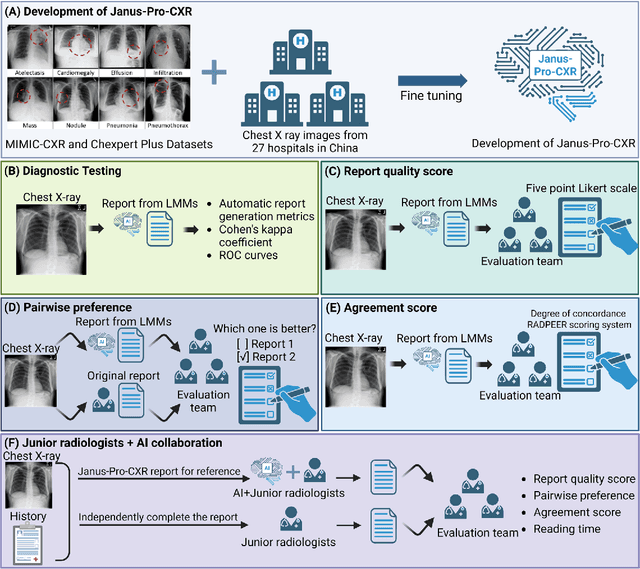
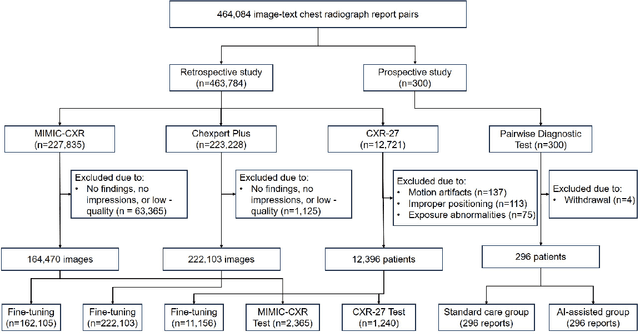
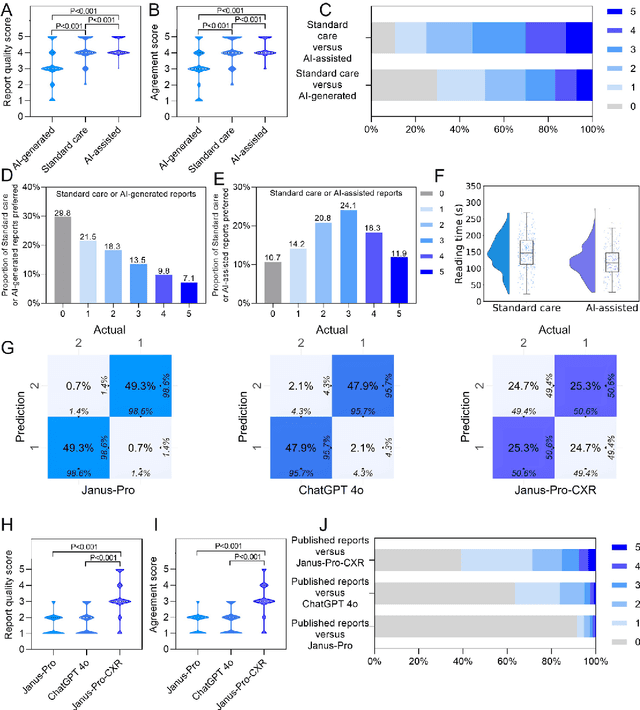
Abstract:A global shortage of radiologists has been exacerbated by the significant volume of chest X-ray workloads, particularly in primary care. Although multimodal large language models show promise, existing evaluations predominantly rely on automated metrics or retrospective analyses, lacking rigorous prospective clinical validation. Janus-Pro-CXR (1B), a chest X-ray interpretation system based on DeepSeek Janus-Pro model, was developed and rigorously validated through a multicenter prospective trial (NCT07117266). Our system outperforms state-of-the-art X-ray report generation models in automated report generation, surpassing even larger-scale models including ChatGPT 4o (200B parameters), while demonstrating reliable detection of six clinically critical radiographic findings. Retrospective evaluation confirms significantly higher report accuracy than Janus-Pro and ChatGPT 4o. In prospective clinical deployment, AI assistance significantly improved report quality scores, reduced interpretation time by 18.3% (P < 0.001), and was preferred by a majority of experts in 54.3% of cases. Through lightweight architecture and domain-specific optimization, Janus-Pro-CXR improves diagnostic reliability and workflow efficiency, particularly in resource-constrained settings. The model architecture and implementation framework will be open-sourced to facilitate the clinical translation of AI-assisted radiology solutions.
Memento: Note-Taking for Your Future Self
Jun 25, 2025Abstract:Large language models (LLMs) excel at reasoning-only tasks, but struggle when reasoning must be tightly coupled with retrieval, as in multi-hop question answering. To overcome these limitations, we introduce a prompting strategy that first decomposes a complex question into smaller steps, then dynamically constructs a database of facts using LLMs, and finally pieces these facts together to solve the question. We show how this three-stage strategy, which we call Memento, can boost the performance of existing prompting strategies across diverse settings. On the 9-step PhantomWiki benchmark, Memento doubles the performance of chain-of-thought (CoT) when all information is provided in context. On the open-domain version of 2WikiMultiHopQA, CoT-RAG with Memento improves over vanilla CoT-RAG by more than 20 F1 percentage points and over the multi-hop RAG baseline, IRCoT, by more than 13 F1 percentage points. On the challenging MuSiQue dataset, Memento improves ReAct by more than 3 F1 percentage points, demonstrating its utility in agentic settings.
PhantomWiki: On-Demand Datasets for Reasoning and Retrieval Evaluation
Feb 27, 2025Abstract:High-quality benchmarks are essential for evaluating reasoning and retrieval capabilities of large language models (LLMs). However, curating datasets for this purpose is not a permanent solution as they are prone to data leakage and inflated performance results. To address these challenges, we propose PhantomWiki: a pipeline to generate unique, factually consistent document corpora with diverse question-answer pairs. Unlike prior work, PhantomWiki is neither a fixed dataset, nor is it based on any existing data. Instead, a new PhantomWiki instance is generated on demand for each evaluation. We vary the question difficulty and corpus size to disentangle reasoning and retrieval capabilities respectively, and find that PhantomWiki datasets are surprisingly challenging for frontier LLMs. Thus, we contribute a scalable and data leakage-resistant framework for disentangled evaluation of reasoning, retrieval, and tool-use abilities. Our code is available at https://github.com/kilian-group/phantom-wiki.
Collaborative Retrieval for Large Language Model-based Conversational Recommender Systems
Feb 19, 2025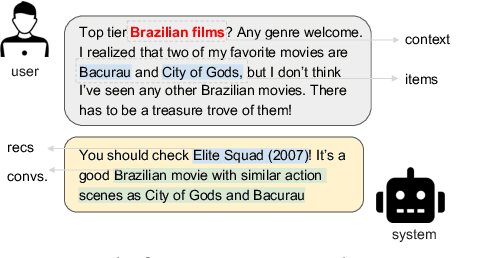

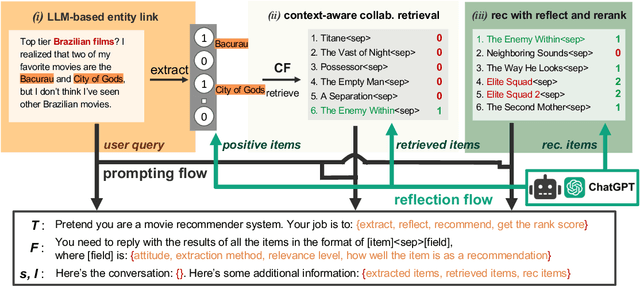
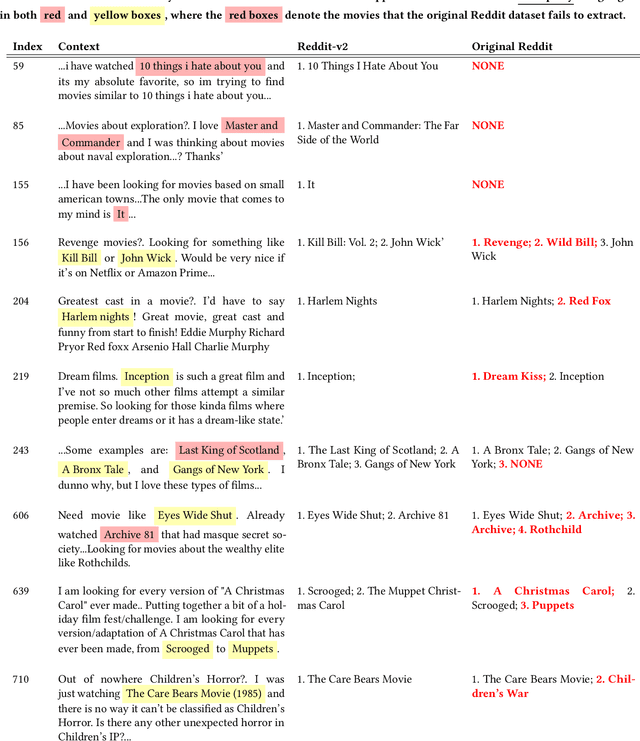
Abstract:Conversational recommender systems (CRS) aim to provide personalized recommendations via interactive dialogues with users. While large language models (LLMs) enhance CRS with their superior understanding of context-aware user preferences, they typically struggle to leverage behavioral data, which have proven to be important for classical collaborative filtering (CF)-based approaches. For this reason, we propose CRAG, Collaborative Retrieval Augmented Generation for LLM-based CRS. To the best of our knowledge, CRAG is the first approach that combines state-of-the-art LLMs with CF for conversational recommendations. Our experiments on two publicly available movie conversational recommendation datasets, i.e., a refined Reddit dataset (which we name Reddit-v2) as well as the Redial dataset, demonstrate the superior item coverage and recommendation performance of CRAG, compared to several CRS baselines. Moreover, we observe that the improvements are mainly due to better recommendation accuracy on recently released movies. The code and data are available at https://github.com/yaochenzhu/CRAG.
Correction with Backtracking Reduces Hallucination in Summarization
Oct 31, 2023
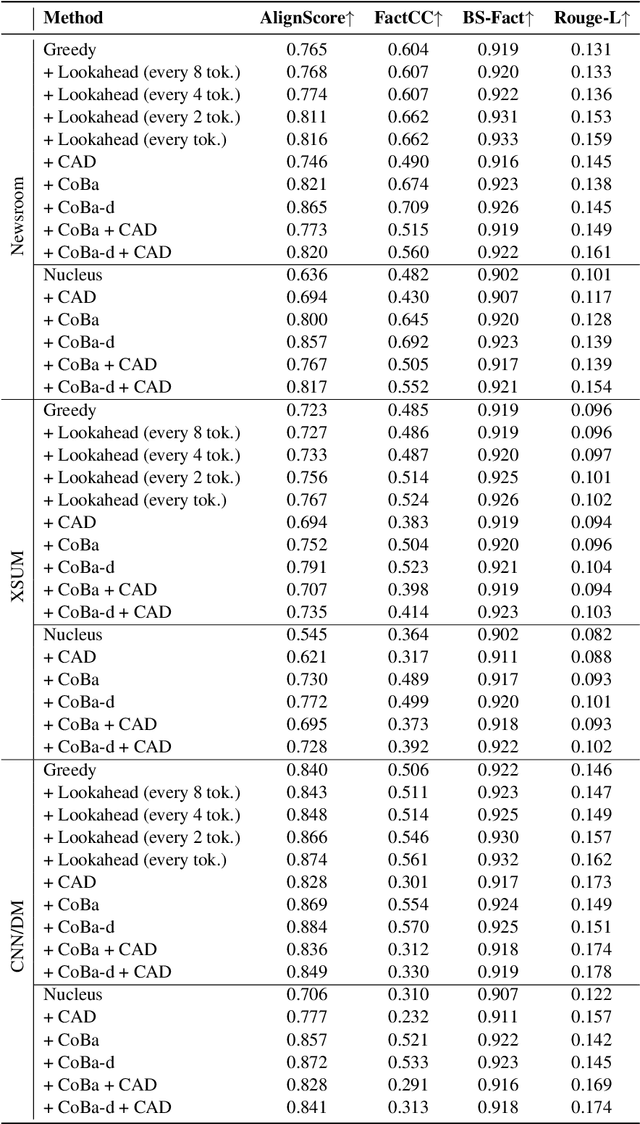


Abstract:Abstractive summarization aims at generating natural language summaries of a source document that are succinct while preserving the important elements. Despite recent advances, neural text summarization models are known to be susceptible to hallucinating (or more correctly confabulating), that is to produce summaries with details that are not grounded in the source document. In this paper, we introduce a simple yet efficient technique, CoBa, to reduce hallucination in abstractive summarization. The approach is based on two steps: hallucination detection and mitigation. We show that the former can be achieved through measuring simple statistics about conditional word probabilities and distance to context words. Further, we demonstrate that straight-forward backtracking is surprisingly effective at mitigation. We thoroughly evaluate the proposed method with prior art on three benchmark datasets for text summarization. The results show that CoBa is effective and efficient in reducing hallucination, and offers great adaptability and flexibility.
IncDSI: Incrementally Updatable Document Retrieval
Jul 19, 2023Abstract:Differentiable Search Index is a recently proposed paradigm for document retrieval, that encodes information about a corpus of documents within the parameters of a neural network and directly maps queries to corresponding documents. These models have achieved state-of-the-art performances for document retrieval across many benchmarks. These kinds of models have a significant limitation: it is not easy to add new documents after a model is trained. We propose IncDSI, a method to add documents in real time (about 20-50ms per document), without retraining the model on the entire dataset (or even parts thereof). Instead we formulate the addition of documents as a constrained optimization problem that makes minimal changes to the network parameters. Although orders of magnitude faster, our approach is competitive with re-training the model on the whole dataset and enables the development of document retrieval systems that can be updated with new information in real-time. Our code for IncDSI is available at https://github.com/varshakishore/IncDSI.
Latent Diffusion for Language Generation
Dec 19, 2022



Abstract:Diffusion models have achieved great success in modeling continuous data modalities such as images, audio, and video, but have seen limited use in discrete domains such as language. Recent attempts to adapt diffusion to language have presented diffusion as an alternative to autoregressive language generation. We instead view diffusion as a complementary method that can augment the generative capabilities of existing pre-trained language models. We demonstrate that continuous diffusion models can be learned in the latent space of a pre-trained encoder-decoder model, enabling us to sample continuous latent representations that can be decoded into natural language with the pre-trained decoder. We show that our latent diffusion models are more effective at sampling novel text from data distributions than a strong autoregressive baseline and also enable controllable generation.
 Add to Chrome
Add to Chrome Add to Firefox
Add to Firefox Add to Edge
Add to Edge